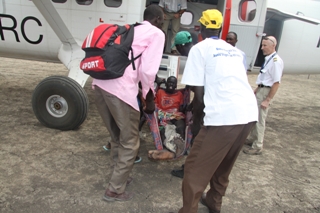South Sudan councils of states meet in Bor, calls for immediate cease fire and disarmament
January 27, 2012 (BOR) – South Sudan Council of states, the second house in the new country’s Juba parliament, held a session in Bor on Friday to discuss insecurity in Jonglei state, which has seen fighting between rival tribes 120,000 people the UN says.

The speaker of the Council of States, Joseph Bol Chan, said that they had come to Bor, the state capital, to encourage the state government to do more in order to normalise the situation.
Between June and December last year over 1,000 people died in raids and counter raids between the cattle raiding groups.
The Luo-Nuer attacked Pibor County displacing over 50,000 members of the Murle tribe. Pibor’s Commissioner has estimated that over 3,000 people were killed in the two-week long raid. The UN has dismissed the figure.
Since the 8,000 armed Luo-Nuer pulled out of Pibor there have been reprisal attacks against Akobo County people.
Jonglei governor, Kuol Manyang had previously appeared before Council of State on January 11, to give security report in Juba.
In his speech before the Councils of States on Friday governor Manyang said the South Sudan army (SPLA) and police had been deployed in Pibor and the other counties that experienced insecurity.
Manyang told the meeting that chiefs in Akobo and Pibor, which he visited last week, are calling for immediate disarmament to remove what he termed as “evil arms in the hands of civilians,”.
The governor appealed to the Council to give pressure the South Sudan government to increase the number of security forces in the state, disarm the people during this dry season, avail food to the affected people and to allocate some funds for the construction of roads in the state.
Earlier this month the South Sudan government declared that Jonglei was disaster area and called for immediate humanitarian aid to the affected counties.
Members of the Councils of States accused Jonglei politicians and intellectuals of inciting the communal violence.
James Magok, a member of the Council, representing Lakes State, accused the Jonglei politicians of having a hand in encouraging the tribal feud.
The fighting had damaged the reputation of South Sudan, which became independent in July as part of a peace deal with north Sudan.
Isaiah Kulang, another member of the Council of States, warned that many more could die if the tribal attacks are not stopped.
John Masua, a member of Council of States representing Western Equatoria suggested an immediate cease fire be announced among the tribes in conflict.
At the meeting it was suggested that the economic roots of the problem needed to be addressed. Many South Sudanese rely on cattle for their livelihoods, status and to pay for brides.
Unless young men were engaged economically the problem of cattle raids is likely to continue, members of the council said.
Governor Manyang agreed that poverty levels among the young men who carry out the raids needed to be addressed.
However, on Wednesday the deputy governor it was the abduction of women and children and the killing of old people in the raids that had triggered the surge in fighting over the last month.
Kornilus Lado, a member of Council representing Central Equartoria state, asked the Juba Government through the Council to grade South Sudan regions according to the level of development and needs.
According to Lado, Jonglei has the highest level of poverty and is the least developed state and therefore should be given extra funds.
The Bishop of Bor, Ruben Akur Ngong issued a request on Thursday that Christians pray for peace in the state.
(ST)
